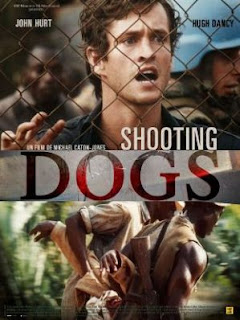
L.R.S organised a Movie night (Shooting Dogs) followed by a Legal iscussion on Thursday 28th January.
According to Wikipedia: Shooting Dogs, released in the United States as Beyond the Gates, is a 2005 film, directed by Michael Caton-Jones and starring John Hurt, Hugh Dancy and Claire-Hope Ashitey. It is based on the experiences of BBC news producer David Belton, who worked in Rwanda during the Rwandan Genocide. Belton is the film's co-writer and one of its producers.
The setting of the film is the Ecole Technique Officielle (ETO) in Kigali, Rwanda in 1994, during the Rwandan Genocide. Hurt plays a Catholic priest (loosely based on Vjekoslav Ćurić[1]) and Dancy an English teacher, both Westerners, who are caught up in the events of the genocide.
Unlike Hotel Rwanda, which was filmed in South Africa using South African actors, the film was shot in the original location of the scenes it portrays. Also, many survivors of the massacre were employed as part of the production crew and minor acting roles.
The film's title refers to the actions of UN soldiers in shooting at the stray dogs that scavenged the bodies of dead. Since the UN soldiers were not allowed to shoot at the Hutu extremists that had caused the deaths in the first place, the shooting of dogs is symbolic of the madness of the situation that the film attempts to capture.
According to Wikipedia: Shooting Dogs, released in the United States as Beyond the Gates, is a 2005 film, directed by Michael Caton-Jones and starring John Hurt, Hugh Dancy and Claire-Hope Ashitey. It is based on the experiences of BBC news producer David Belton, who worked in Rwanda during the Rwandan Genocide. Belton is the film's co-writer and one of its producers.
The setting of the film is the Ecole Technique Officielle (ETO) in Kigali, Rwanda in 1994, during the Rwandan Genocide. Hurt plays a Catholic priest (loosely based on Vjekoslav Ćurić[1]) and Dancy an English teacher, both Westerners, who are caught up in the events of the genocide.
Unlike Hotel Rwanda, which was filmed in South Africa using South African actors, the film was shot in the original location of the scenes it portrays. Also, many survivors of the massacre were employed as part of the production crew and minor acting roles.
The film's title refers to the actions of UN soldiers in shooting at the stray dogs that scavenged the bodies of dead. Since the UN soldiers were not allowed to shoot at the Hutu extremists that had caused the deaths in the first place, the shooting of dogs is symbolic of the madness of the situation that the film attempts to capture.
The main points discussed in this session were how can humanity avoid fallen into tragedies like the Rwandan one in 1994? How can we make sure that states will only use force in a humanitarian intervention without being motivated by other unclean hidden agenda?
Furthermore, some argued that it is most worrying to stand still while tragedies like this happen in different parts of the world. In the same time we do not want to provide greedy powerful nations the legal tool to utilise in their new colonisation plans or to serve their own interests while intervening in other states’ domestic affairs, a member of the audience pointed.
For more information about the concept of humanitarian intervention you can contact us by email or just add your request as a comment below.

Comments